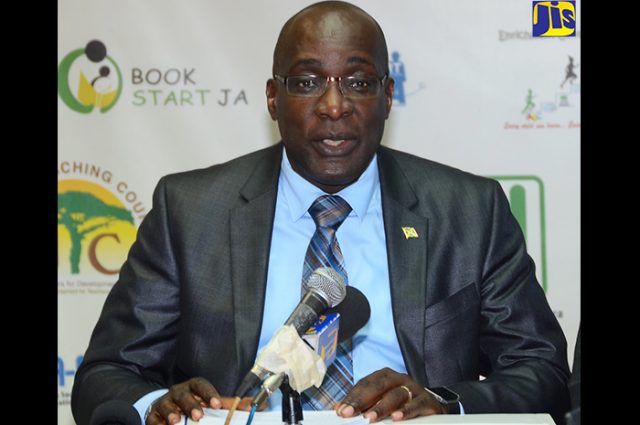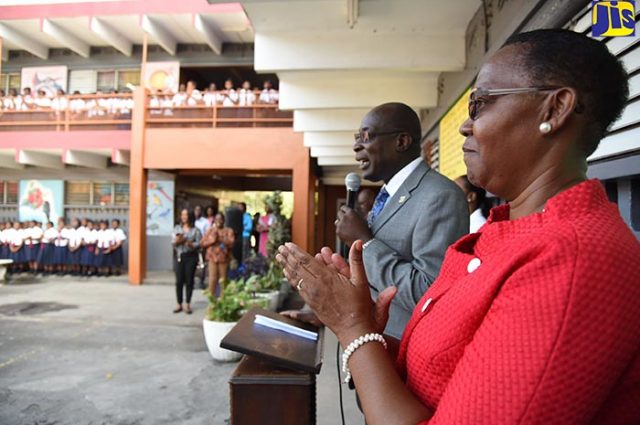JIS: My fellow Jamaicans, as we begin this new school year 2017 / 2018, we do so with much optimism and confidence that this will be a very good year for the education of our young people in Jamaica.
Much work has been done to lay the foundation for improved student performance. School plants have been renovated, furniture and other equipment have been provided and most important, the first tranche operational grants have been sent to our schools in good time to allow for the smooth re-opening of our institutions.
Last year, we experienced a tremendous partnership among stakeholders – teachers, the Jamaica Teachers Association, students, parents, school board members, administrative, ancillary, and staff of the Ministry of Education, Youth and Information.
Together we must build on that partnership and stakeholder engagement this year as we continue to work for the educational development of our children and overall economic growth in our country.
So we start this new school year with a great sense of hope that our united efforts will lead to better education outcomes.
The encouraging results from our students’ performance in the GSAT exams and improvements at the CSEC, CAPE, NVQJ and City and Guilds levels point to the progress being made through new initiatives to improve outcomes. With the continued excellent guidance of our teachers and application of our students we will see good results.
I turn now to our plans and policies for the education system for the start of the 2017/2018 academic year.
We now spend over thirty seven billion, six hundred and ninety nine million, six hundred and twenty four thousand, three hundred and sixty one dollars (37,699,624,361) on secondary education which includes Salaries, Grants, TVET, ICT, Science, Infrastructure, furniture and nutrition. That means we are spending between $176,994 and $190,000 per capita at the secondary level.
We will honour our commitment to increase funding to Primary, All Age and Junior High Schools for the academic year 2017/2018 with a budget of $1B outside of salaries.
In the meantime, we have adopted a non-obligatory policy towards the payment of parents’ contribution. We are however encouraging parents to contribute to their schools once agreement has been reached and approved by the Board of Governors.
New policies are also in place to help schools address pressing problems and help with their cash flow.
i. The first tranche has already been disbursed from June 2017.
ii. The second tranche to be disbursed in the second week of September.
iii. The third tranche in the second week of December.
iv. The fourth tranche will be paid in the second week of April 2018
All other support grants to school including STEM, TVET, Curriculum, Infrastructure repairs are being disbursed.
In addition to the support mentioned earlier, we are also providing other areas of support for the new school year:
These include payment for: • Additional teachers for those schools that require special support based on the nature of the students and special programmes being offered.
• Twenty five (25) temporary Deans of Discipline
• Over 1000 young persons to be engaged as lab technicians, Safety and Security Support Officers, Clerical Officers and environmental Wardens will be placed in selected schools.
• Payment of 913 cooks across the system to the tune of 274.8 million.
• Upgrading of canteens and provision of equipment to the tune of over $200 million
This administration believes no child should be left behind because of the family’s economic circumstances. So the Government has increased funding for students on PATH to ensure they receive lunch for five days per week and literature books commencing with the grade 7, 10 and 11 in this new term at a cost of $116 million.
Payment for insurance will also be made for students on PATH and wards of the State at a cost of $26M.
PATH allocation of $2000 will be used to cover the cost of ID and uniform related items. Book vouchers are being provided for the neediest students up to $ 2000 per student. Total to be spent is $50M.
Transportation will be provided for students on PATH in eight parishes.
This will be done in collaboration with the Ministry of Labour and Social Security (MLSS) as well as the Ministry of Transport and Mining. A total of $200M will be allocated for this activity.
At the early childhood level, many of our institutions need help. As part of the efforts to improve standards and give our children a strong foundation as they begin their education journey, the
Ministry will be taking over a number these schools. In addition with the support of the Ministry, 117 basic schools will be converted into 56 Infant Departments.
Our mantra Every child can learn, every child must learn is at the centre of what we do. So we are ensuring that our children with special needs are not left behind. The Ministry’s Special Education Unit will place one thousand, four hundred and seventy four (1,474) students in special education facilities at a cost of fifty seven million, seven hundred and eighty six thousand, two hundred and forty dollars ($57, 786, 240), for 2017- 2018.
Of course, among the most essential tools for students are textbooks. Therefore under the National Textbook Loan Scheme and the Primary Textbook Programme, the Ministry of Education is spending approximately eight hundred million ($800,000,000.00) on books for the new school year. The delivery of books to schools has started and will be completed by October 6, 2017.
With regard to nutrition, the Ministry of Education, Youth and Information School Feeding Unit in collaboration with the Nutrition Products Limited will continue to provide funds and or snacks to schools directly for the School Feeding Programme.
The Ministry is happy to report that the delivery of furniture to schools primarily for students started from the second week in July and will be completed by the last week of September.
To ensure that critical infrastructure issues are addressed, we have identified 172 schools for upgrades from the Schools Maintenance Project at a cost of Five Hundred and Fifty-four Million Three
Hundred and Three Thousand Eight Hundred and Eighty Dollars ($554,303,880.00).
This infrastructure upgrade also addresses sanitation concerns. Forty two schools still utilize pit latrines as the only means of faecal disposal. As such, Seventy-six million dollars ($76,000,000.00) has been allocated in the 2017 – 2018 budgets for 35 schools under the Ministry’s Sanitation Programme.
Schools are being encouraged to ensure that safety and security committees are in place and that the safety and Security Guidelines are utilized within the schools to treat with this area.
We began the phased roll out of the new national curriculum last year and for this year it will be fully implemented in all grades up to grade 9 in the first term of the new school year. The Alternative Pathway for Secondary Level Education will also be launched in 84 schools.
In the meantime, the Career Advancement Programme has been expanded as the flagship programme for the creation of an additional two years at the secondary level. Over 123 schools have been approved to offer the programme to date and others are being processed.
My fellow Jamaicans, this year we have another great opportunity to redouble our efforts to help create an education system which enables every child to achieve his or her full potential.
As we do so in a spirit of unity and partnership, this will be to the benefit of all of us in the short, medium and long term. Together let us rise and build Jamaica, land we love.
Thank you.
CAPTION: Minister of Education, Youth and Information, Senator the Hon. Ruel Reid. (FILE).











